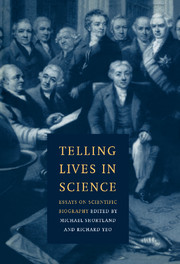Book contents
- Frontmatter
- Contents
- List of contributors
- Preface
- Introduction
- 1 Existential projects and existential choice in science: science biography as an edifying genre
- 2 Life-paths: autobiography, science and the French Revolution
- 3 From science to wisdom: Humphry Davy's life
- 4 Robert Boyle and the dilemma of biography in the age of the Scientific Revolution
- 5 Alphabetical lives: scientific biography in historical dictionaries and encyclopaedias
- 6 The scientist as hero: public images of Michael Faraday
- 7 ‘Tactful organising and executive power’: biographies of Florence Nightingale for girls
- 8 Taking histories, medical lives: Thomas Beddoes and biography
- 9 The scientist as patron and patriotic symbol: the changing reputation of Sir Joseph Banks
- 10 Metabiographical reflections on Charles Darwin
- Index
9 - The scientist as patron and patriotic symbol: the changing reputation of Sir Joseph Banks
Published online by Cambridge University Press: 28 October 2009
- Frontmatter
- Contents
- List of contributors
- Preface
- Introduction
- 1 Existential projects and existential choice in science: science biography as an edifying genre
- 2 Life-paths: autobiography, science and the French Revolution
- 3 From science to wisdom: Humphry Davy's life
- 4 Robert Boyle and the dilemma of biography in the age of the Scientific Revolution
- 5 Alphabetical lives: scientific biography in historical dictionaries and encyclopaedias
- 6 The scientist as hero: public images of Michael Faraday
- 7 ‘Tactful organising and executive power’: biographies of Florence Nightingale for girls
- 8 Taking histories, medical lives: Thomas Beddoes and biography
- 9 The scientist as patron and patriotic symbol: the changing reputation of Sir Joseph Banks
- 10 Metabiographical reflections on Charles Darwin
- Index
Summary
Science no less than religion needs its gallery of saints as sources of emulation to provide a sense of continuity and tradition. But, inevitably, posterity is selective in drawing up such a roll-call of the blessed as the past is scavenged for figures who seem best to conform to the needs of the present. Scientists of the nineteenth and twentieth centuries accorded most respect to the founding fathers of their discipline who left their mark in the manner most familiar to scientists of a later age. In seeking such a patrimony, science has understandably overlooked the claims of Joseph Banks, who published very little and left no indelible mark on any scientific discipline. But, as science has grown in size, complexity and expense so, too, the scientific estate has come increasingly to value the role of its patrons, protectors and paymasters. As a consequence, more attention has been accorded of late to statesmen of science like Francis Bacon. There are also a few signs that the significance of Banks as a promoter of science is beginning to be recognised, the most notable being the recent appearance of the first fully researched biography of Banks by H.C. Carter – a work which will serve as a precursor to an edition of his papers.
- Type
- Chapter
- Information
- Telling Lives in ScienceEssays on Scientific Biography, pp. 243 - 266Publisher: Cambridge University PressPrint publication year: 1996
- 1
- Cited by



